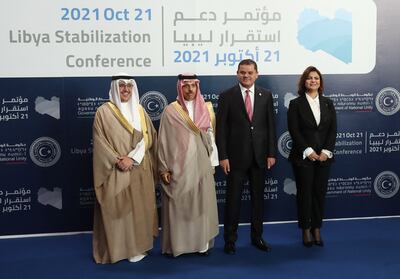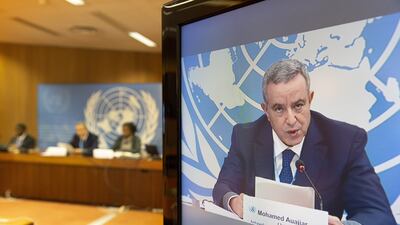Libya's fragile unity government hosted senior foreign officials on Thursday to drum up support on serious transitional issues as the war-torn country gears up for an election in December.
Abdul Hamid Dbeibah, head of the interim government, promised that the vote would be held "on time" and urged "respect for the results".
"Your presence is proof that we are on the road to peace," he told the Conference in Support of the Stability of Libya.
Kuwaiti Foreign Minister Sheikh Ahmed Nasser Al Sabah called for “the gradual and simultaneous removal of all mercenaries and foreign forces from Libya".
The foreign minister reaffirmed his country's "commitment to Libya’s unity and sovereignty".
Turning to the looming December vote, he said there was widespread enthusiasm among Arab countries that the elections go ahead on time.
The gathering came two months before planned presidential polls under a United Nations-led peace process that seeks to end a decade of conflict and chaos.
Libya and the UN have been striving to break the cycle of violence that has wracked the country since the 2011 uprising that drew Nato intervention and toppled and killed dictator Muammar Qaddafi.

"Tripoli has recovered. It is the capital of all Libyans," Mr Dbeibah said in his opening speech at the conference.
A ceasefire between eastern and western factions last year led to a unity government taking office in March with a mandate to take the country to elections.
The presidential vote is set to take place on December 24 but legislative polls have been delayed, with a date to be set in the new year, amid the wrangling.
Thursday's conference aims to “gather the necessary support, in a transparent way” for the presidential election, said Foreign Minister Najla Mangoush in a video published by her ministry on Sunday.
Foreign powers have been pushing hard for the election to be held as scheduled after the date was agreed at UN-led talks last year. But the process has been beset by sharp disagreements over the legal basis for the vote.
"There is no stability without full national sovereignty," Ms Mangoush said.
The UN Under-Secretary General for Political Affairs, Rosemary DiCarlo, insisted on the importance of the December elections to "complete the transitional phase".
She called on international organisations to send "special envoys to observe this operation" and to guarantee its transparency.
As Libya faces multiple accusations of mistreatment of irregular migrants, Ms DiCarlo urged authorities to speed up the repatriation of stranded refugees and to release migrants in detention.

Foreign powers have backed various sides in Libya's complex war and the presence of mercenaries and foreign troops is one of the toughest obstacles to lasting peace.
Last December, the UN estimated that 20,000 foreign fighters were present in Libya.
They range from Russians sent by the Kremlin-linked Wagner group to African and Syrian mercenaries and Turkish soldiers stationed under a deal with a previous unity government at the height of the last round of east-west fighting.
Ms Mangoush said the fate of these fighters will feature high on the agenda at Thursday's conference and that the foreign armed presence “represents a threat not just to Libya but to the entire region".
The minimal progress since a January deadline for their full departure under a ceasefire deal reflects the complexity of the issue.
Tripoli has said a “very modest” number of fighters have left.
This month, a joint commission of eastern and western military commanders agreed on a road map for their departure, but it lacked a timetable.

